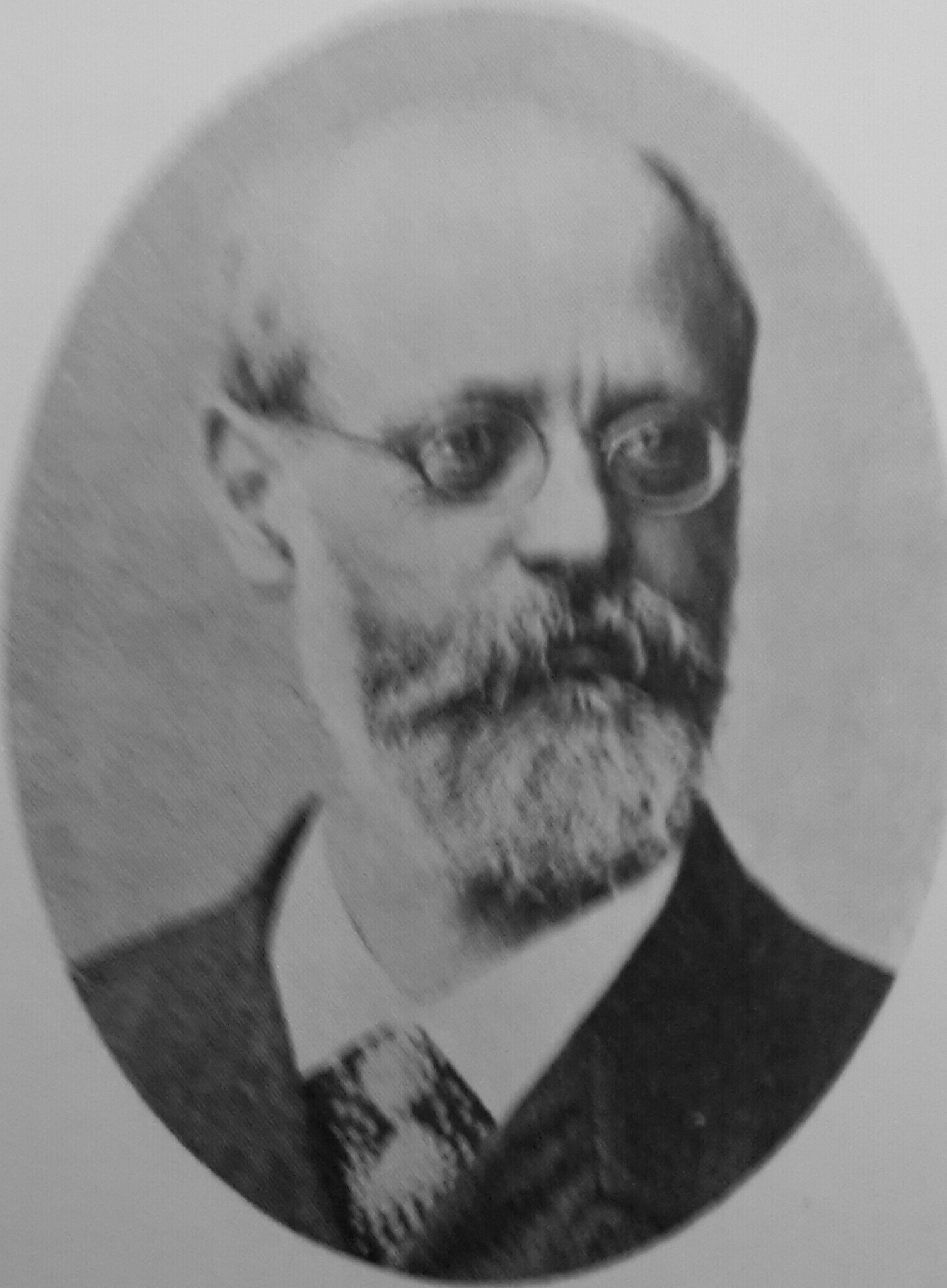Karl Kautsky (1854-1938)
Karl Kautsky was a leading theoretician of social democracy. 
Karl Kautsky became a member of the Social Democratic Party of Austria (SPÖ) in 1875. From 1885 to 1890, he spent time in London, where he became a close friend of Friedrich Engels; in 1891, he co-authored the Social Democratic Party of Germany (SPD)'s Erfurt Program together with August Bebel and Eduard Bernstein.
Following the death of Friedrich Engels in 1895, Kautsky became one of the most important and influential theoreticians of socialism. He stayed with the party when Rosa Luxemburg and the party's left wing broke with it in 1916 over its support for the First World War (see Spartacist League), but changed his mind in 1917 and left for the Independent Social Democratic Party of Germany (USPD), of which he was a member from up to 1919. In 1922 he re-joined the SPD.
Kautsky was described as a "renegade" by Vladimir Lenin, and he in turn castigated Lenin in his 1934 work Marxism and Bolshevism: Democracy and Dictatorship:
"The Bolsheviki under Lenin’s leadership, however, succeeded in capturing control of the armed forces in Petrograd and later in Moscow and thus laid the foundation for a new dictatorship in place of the old Tsarist dictatorship.*"[1]
Karl Kautsky lived in Berlin-Friedenau for many years; his wife, Luise Kautsky, was a close friend of Rosa Luxemburg, who also lived in Friedenau, and today there is a commemorative plaque where Kautsky lived at Saarstraße 14. He died in exile in Amsterdam at age 84.
The above is from the Wikipedia article.
Below is a selection from his "Methods of Peace-Making" (8 February 1923) pasted from a Marxist site. More of Kautsky's writings can be found here.
Kautsky's recommendations for peace are more negative than positive. Dictatorship and militarism make peace fragile. Bolshivism and its ruthlessness are threats to peace. He says we must fight against it, but he doesn't say how. Certainly, a political struggle is implied. Today, almost fifteen years after the fall of the Soviet Union, what Kautsky called "National Bolshevism" seems strong in too many parts of the world: the idea that the force of arms can and should be used to achieve social goals. If democracy is to mean more than the holding of elections, it cannot be imposed by the force of arms any more than religious orthodoxy can, if that is to mean real faith and not coerced conformity to the external trappings of religion.
Karl Kautsky, Methods of Peace Making, Justice, 8 February 1923, p.2.
Transcribed by Ted Crawford.
Marked up by Einde O’Callaghan for the Marxists’ Internet Archive.
When the great Powers of the West went into the war against Germany they declared that this must be the last war. The victory should bring a peace of perpetual duration. However sceptical one might be as regards this latter prospect, one might at least have expected that the peace would last as long as the peace concluded by the conquerors of Napoleon a hundred years ago. Instead of this, the various Treaties of 1919 have only altered the form of war: the latter is still going on. Just now we are experiencing a military invasion of Germany, which is war none the less for being an attack on an unarmed civilian population by a force fitted out with all the up-to-date instruments of destruction.
1814 and 1919
How is it possible that the most enlightened democracies of our own days have not succeeded in doing what the very reactionary Governments of the Holy Alliance accomplished? The reason is that the latter had at least some notions of European solidarity. True it was a solidarity of anti-revolutionary Governments, but it was strong enough to make them reconstitute France in 1814, after a series of wars lasting over twenty years, with the frontiers of 1792 and without any indemnities. Even after the return and defeat of Napoleon in 1815 the conditions were not materially worsened, and an indemnity of 790 million francs imposed. France had its representatives at the Council Board when the treaties were negotiated. Why? Because the purpose was to get rid of Napoleon, not only by defeat in battle, but by creating such conditions that the regime in France which succeeded him had a reasonable prospect of stability.
The Allies of 1918 had no such concern. True, they had declared to make war upon the dynasties of the Hohenzollerns and Habsburgs. Paragraph 227 of the Versailles Treaty names William II as the culprit, but in paragraph 231 it is “Germany” which is responsible. The reactionist Governments of 1814 were conscious of their solidarity with the reactionist Government of France. The democratic Governments did not show the least sympathy for the German Republic, which was treated as if the German nation was a gang of criminals. And yet the German people of 1918 had taken more decisive steps against William than the French in 1814 against Napoleon, whom, in fact, they received again with jubilation in 1815 and followed faithfully to Waterloo.
“National Bolshevism”
If the Governments of the Entente had treated the German Republic, with at least some consideration, the ideas of Kaiserism and militarism would have disappeared for ever from Germany, the development of the productive forces would have sufficed to make good the ravages of the war, and the blessings of peace secured for a long time, perhaps for ever, if the Socialist Parties in the decisive great States should during the next few decades succeed in establishing governments of their own.
And yet! The protagonists of the democracies, Wilson, Lloyd George and Clemenceau, all good Radicals and Democrats, put together the least durable of peace treaties that ever was framed. Why? The brutalising effects of this most terrible of all wars, the intoxication of complete victory, the utter defeat of the antagonists, the gigantic character of the task to put right a world completely out of joint – these created the situation. Never were the methods of procedure by full debate and negotiation more called for. Instead of which we had peace terms dictated autocratically, and the era of continuing the war in peace commenced. This may be called the era of “National Bolshevism,” as the victory of a section of the Russian movement has produced Social Bolshevism. Here as there the same disregard of facts, the same ruthlessness and pitiless destruction of opponents.
French and Prussian Militarism
This process of destruction cannot last, of course. Sooner or later other methods must be adopted. The sobering process has made itself felt first in the Anglo-Saxon countries, not in France. There is a French militarism as well as a Prussian militarism. Now militarism means not only having a large army, but being enthusiastic about it and sharing its mentality. French militarism had two culminating periods, under Louis XIV, and Napoleon I., but on the whole has not been so successful as Prussian militarism, which up to 1918 had known only one great and real defeat in 1806.
That the policy adopted by Poincaré and its consequences will have a sobering effect on French mentality is certain, though the National Bolshevism in that country has larger resources of power than anywhere else, But National Bolshevism ruins not only other countries but its own as well. The Ruhr adventure cannot by any discernible possibility relieve the burdens of taxation already imposed and yet to be imposed upon the French masses of peasants and workers. The economic motive behind this policy, the demand of the French heavy industry for the Ruhr coal, is not likely to make these burdens more acceptable to the French people, nor will it profit by the dismemberment of Germany. However, if by passive resistance Poincaré’s attempt is defeated, this may mean for France great inconveniences and burdens, but for Germany hunger and misery amongst the workers, and a bankrupt industry. When that moment arrives it will be time to replace dictatorial methods, by democratic negotiation.
No Preaching Of Revenge
To do all this it is however necessary for us to keep tight grip on our own National Bolsheviks.
Therefore, no preaching of revenge, of hatred, and repudiation of the Versailles Treaty off our own bat. Our enemy is National Bolshevism everywhere; our friend, whichever nation he may belong to, who will fight against it, so that at long last we may arrive at democratic methods in settling differences between nations, bring peace to the world, and secure economic welfare, which can never be reached by methods of dictatorship.
From Vorwärts



 When I first met Dietrich Bonhoeffer, through reading his books as a young seminarian, he explained the world of faith to me. This young German theologian who was executed by the Nazis for his opposition to Hitler helped me to understand the difficult religious experiences I had known in America.
When I first met Dietrich Bonhoeffer, through reading his books as a young seminarian, he explained the world of faith to me. This young German theologian who was executed by the Nazis for his opposition to Hitler helped me to understand the difficult religious experiences I had known in America.  During a stint at Union Theological Seminary in New York City, Bonhoeffer's response to theological liberalism was tepid, but he became inspired by his involvement with the Abyssinian Baptist Church in Harlem. Meeting the black church in America showed the young Bonhoeffer again that a real Christ was critical of the majority culture.
During a stint at Union Theological Seminary in New York City, Bonhoeffer's response to theological liberalism was tepid, but he became inspired by his involvement with the Abyssinian Baptist Church in Harlem. Meeting the black church in America showed the young Bonhoeffer again that a real Christ was critical of the majority culture.


